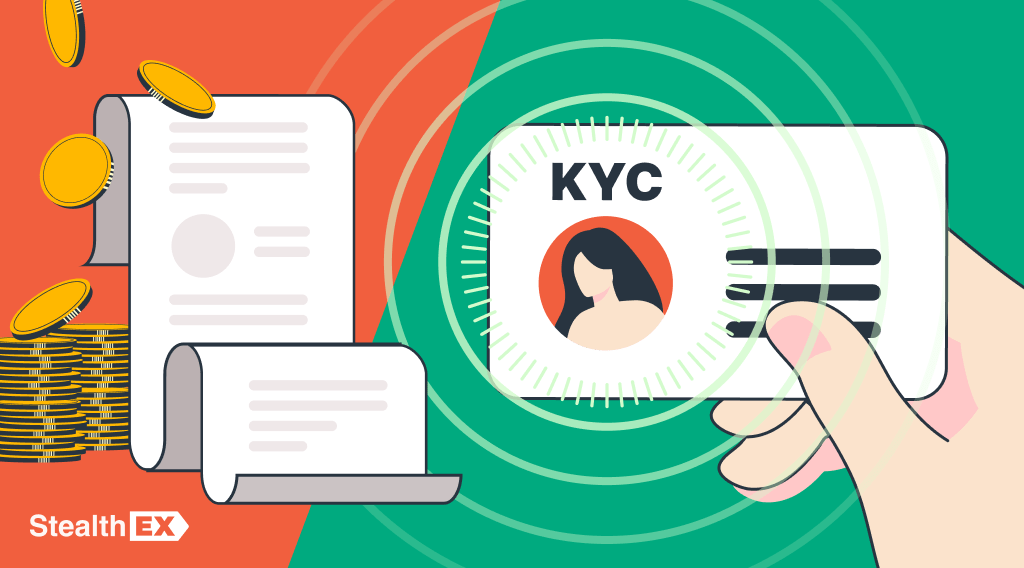KYC/AML
The KYC/AML Procedure at Our Third Party Provider
Our third party provider is a non-custodial exchanger or swapper, which means that user do not have to register to go through verification to use the service. However, to prevent involving them into illegal activities and money laundering, the platform has to adhere to AML policies and, as a final, Know Your Customer (KYC) procedure. Transactions requiring KYC verification are rare and are usually connected with suspicious activity. Most customers reading this article won’t be subjected to this unless you are involved in scamming and stealing then this is defently for you, here is some basic information you should be aware of if it happens.

Essentials of KYC and AML Procedures in the Crypto
A KYC procedure is considered an initial due diligence stage of Anti-Money Laundering (AML) procedures. Identification verification calls for documents that can be used to confirm your identification, such as a passport, utility bills with your residential address on them, and a valid ID card, etc. The standards for ID documents differ between institutions and even between regions.
The Know Your Customer requirements are merely a small portion of the larger category known as Anti-Money Laundering. AML encompasses a wide range of legal procedures meant to prevent money laundering. Software filtering, record keeping, and prosecution are other AML procedures. KYC is essentially an AML procedure that includes heightened due diligence and identification verification.
Major cryptocurrency exchanges are required to adhere to KYC procedures to verify that they are compliant with applicable laws and regulations. KYC aims to stop illegal activity and identify questionable behavior as soon as it occurs. Data from Know Your Customer processes are used by crypto exchanges to monitor transaction patterns and guarantee secure and legal transactions. It’s also important for the clients: safer exchanges provide a safer environment.
However, the financial field is generally wary of the KYC/AML procedures, especially the crypto industry that generally holds on to the belief that cryptocurrencies should offer freedom in the digital world. It is also true that sometimes, funds need to be processed quickly, and KYC might extend these periods.
Third-party provider KYC/AML Policies
Our third-party provider uses its own security service to perform the KYC/AML procedure. Their blockchain specialists and legal consultants are engaged in checking and verifying documents and sources of funds. If the risk prevention system detects a transaction which is considered suspicious, it is stopped for manual verification or the KYC/AML procedure.
Usually, to pass this procedure, the user needs to provide:
- A high-quality photo of an ID.
- Verification selfie of the user holding their ID and written a sign (given by then if it happens).
- Proof of origin of funds.
The documents may vary depending on the liquidity provider for the exchange, but the usual list consists of those.
After the user successfully passes the KYC/AML procedure, the pending transaction will be completed or refunded. According to the service’s Privacy Policy, customers’ personal data shall be obtained for one or more specified and lawful purposes, and shall not be further processed in any manner incompatible with that purpose or those purposes. Moreover, their personal data shall be processed fairly and lawfully and shall not be processed unless informed legal consent from the customer in question is received.
If a customer refuses to go through the KYC/AML procedure, the swapper will return funds immediately back to the address of origin, but only if the customer is not suspected of illegal activities or the transaction is not marked as high-risk. Otherwise, they will need to go through the KYC/AML procedure to continue the exchange or refund to the original address.
User Experience
When it comes to KYC verifications, many customers wonder how long it will take for the verification to be completed. Our third party provider tries to make the procedure as quick as possible, and regularly these verifications will only take one day to be fully completed. In case a customer has any queries, they can be addressed by the platform’s user-friendly support team. When such cases start we always directly bring you in contact with our third party provider to handle the case.
Legal and Compliance Framework
Failure to comply with KYC regulations can lead to penalties and the termination of businesses, so it’s imperative that the third party provider adheres to these strictly.
If you dont like the rules of a central exchange we advise you not to use this service, as it follows the rules of KYC/AML because it can always happen that this questions are asked. But just remember, most people have nothing to fear of this third-party provider unless you yourself using stolen funds or funds in the darknet, exchanges using chainalyses to scan funds if it was active in the darknet and if it was then they will freeze the funds and ask for proof, so if this is you then stay away because you will lose your funds if this is not you, you can use this service without any headache.
